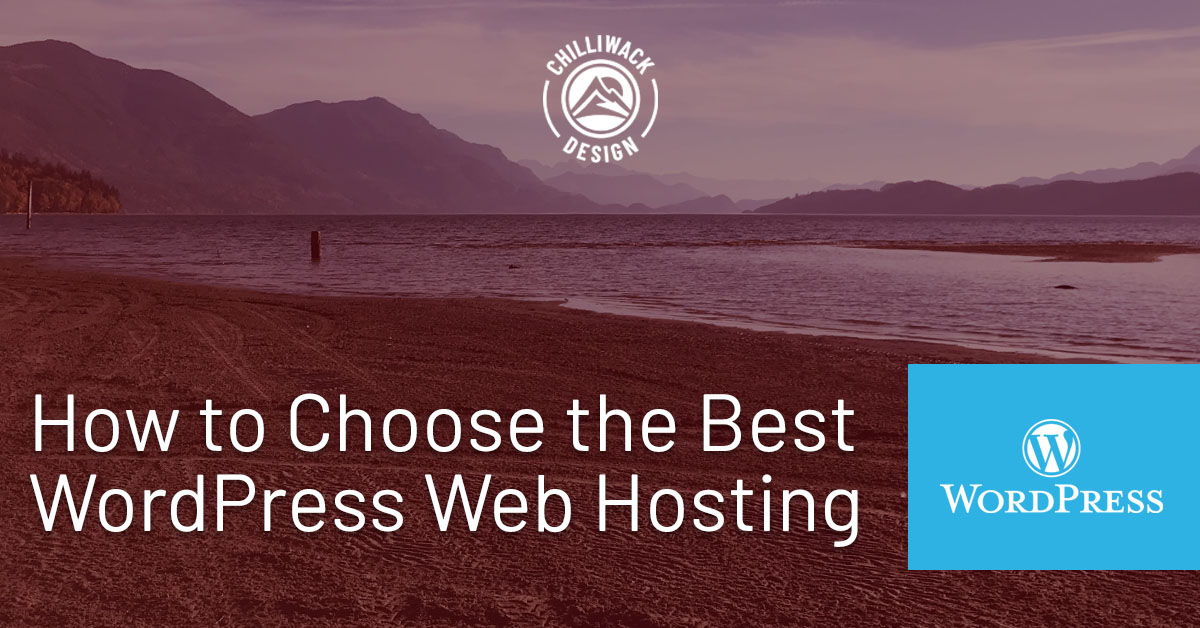How to Choose the Best WordPress Website Hosting
This post may contain affiliate links. If you use these links to buy something, we may earn a commission at no extra cost to you. Thank you for your support!
Introduction
You need website hosting to power your website. But with so many choices, how do you choose the right one that’s right for your business goals and budget?
With this beginner’s guide you’ll learn everything you need to choose the best WordPress hosting for your business.
What Is Web Hosting?
A Website hosting server is a computer that connects users to your site, from anywhere in the world.
The server provides storage space for all the files, code, images, and content associated with your website.
Web hosting can also power your email, databases, and a whole lot more.
Why You Need Website Hosting
If you want your business to be seen on the Internet, choosing a website host is your first place to start.
Your website can do a lot of heavy lifting for you: sell products, accept payments, educate your users, allow people contact you, run automated tasks, show off what you do, and a whole lot more. All while you sleep, or run other aspects of your business.
What to Look for in a Hosting Company
With hundreds of reliable hosts to choose from, each with different plans, it can be a little overwhelming to choose the best one.
The company you choose is going to power your online presence, so it’s an important business choice to make upfront.
That’s why we’ve broken it down. Here are the 5 factors you should consider when choosing a WordPress web host:
Price
Website hosting can range from free, to a few dollars a month, to hundreds, or even thousands depending on what storage space, server hardware, and additional features your website needs.
Like with most things, you can expect to get what you pay for. Free hosting could mean limited features, and advertisements which you have no control over.
Hosting that’s hundreds of dollars per month is likely overkill for a small WordPress website, and will cut into your profits.
So What Should You Pay for Website Hosting?
If you’re a small business owner looking for WordPress hosting for a 5-10 page site, you can expect to pay around $12 CAD a month.
HostGator has entry level WordPress hosting plans that will work great for you.
If you’re ready to take things to the next level, you may want to consider WP Engine. For about $33 a month, you’ll see faster load times, automatic updates and have managed hosting.
Yearly Discounts
Oftentimes, you’ll get a better deal if you pay for hosting upfront for the year, or several years in advance, rather than month to month.
It makes sense to pay upfront and save money, since you’ll have your website for as long as you have your business.
Hosting Coupons
Always check for coupons, introductory rates, and special prices for new customers before committing to a website hosting package.
Performance
Uptime Guarantee
If your website is down, that means customers can’t find you. You won’t receive emails, the search engines can penalize your site if it’s down for too long, and essentially your doors are closed for business. Not good, right?
Luckily most reputable hosts offer a 99% (or more) uptime guarantee which is what you should look for.
Speed!
Website speed is an important factor when it comes to ranking higher up the Google search results.
If your website loads too slowly, it creates a bad experience for the user and they’ll be more likely to leave before finding what they came for.
Although there are plenty of ways we can make your site load faster, speed starts with the host.
Here are Hostgator’s 7 Tips For speeding up your website.
User-Friendly Admin Panel
Your host should provide a user-friendly admin panel like cPanel to help manage your hosting account.
This will allow you, or your IT support to manage server settings, email accounts, the file manager, one-click WordPress installs, security settings, databases, and a whole lot more.
Check out Hostgator’s beginner guide to cPanel.
Or, if you want a more hands-off approach, the experts at WP Engine offer managed hosting which means they take care of the setup and management, backups, and monitoring of uptime of your server.
Learn more about what’s included with managed WordPress hosting.
Bandwidth
Bandwidth is the amount of data (website files, code, images etc) that are sent over an internet connection in a given time. It’s measured in bits per second.
If you’re just starting out with a small WordPress site, you likely won’t have to worry too much about bandwidth.
Once you start getting more traffic to your site, this is something you’ll want to pay closer attention to.
Storage/Disk Space
10GB frequently offered with starter hosting plans is easily enough to handle a 5-10 page starter WordPress website, and a few email accounts.
However, as your site grows and you start uploading more and more pictures to your blog, after a couple of years you may find yourself needing more storage space.
You can either choose to delete and/or optimize images you’re not using, or increase your storage space which is easy to do.
Start small and upgrade to the next hosting package hassle-free when you’ve outgrown your current plan.
There are 3 main types of hosting environments to consider for your website depending on where you’re at with your online presence:
Shared hosting is the most affordable option to get you started online
Usually that means sharing a server with hundreds of other sites which keeps costs low.
But keep in mind, other sites could potentially impact your site; bringing it down, or causing it to load slowly if another site owner abuses their privileges.
Shared hosting is generally in the $12 a month range.
VPS Hosting
Next up the hosting ladder is a VPS (virtual private server).
A VPS is one server that functions as separate servers.
This configuration gives you faster performance and a better quality experience than shared hosting, since you won’t be impacted by how much resources other sites use.
This is an exciting step in your business if you’re considering taking the leap from shared to a VPS!
VPS hosting generally starts in the $50 a month range.
Dedicated Hosting
Dedicated hosting is for advanced websites that require the fastest hosting, bandwidth, storage space, RAM, support, and that can handle a large number of visitors.
It’s a dedicated server with resources for a single client.
Dedicated servers generally start at $100+ per month.
Additional Features
Site & Email Migration
Is the hosting company you’re considering able to transfer your existing website and/or email accounts to the new server for free?
Most hosts offer this service free of charge to secure your business, but some charge a la carte.
Email Accounts
How many email accounts does your hosting account come with? Some hosting companies offer unlimited email accounts, with a disk space limit you can set that goes against your overall storage capacity.
Some hosting companies like WP Engine who are dedicated WordPress hosts, require you to purchase your email elsewhere, like from your domain provider such as GoDaddy.
Staging Server
Does your host come with a staging server, or at least allow you to set up a subdomain so you can work on your site instead of the live version?
If you’re making big changes to your site, you likely won’t want to work on the live version in case something breaks.
With a staging server, you can make changes on a cloned version of your site. Then when you’re happy with the results, you can publish those changes to the live version. This ensures a better user experience, and less stress for you to make changes.
Automatic Backups
Will your host automatically backup your website on a different server? If your site gets hacked, or you make some accidental changes, you need to be able to restore a backup of your site.
If the host you’re considering advertises automatic off-site backups, find out how often those backups are made.
Every month? Every week? Every day?
The more the better so you have more restore points to fall back on.
Security/SSL
Does your host include SSL certificates? SSL ensures that your visitors’ data is encrypted. This is especially important if you accept credit card payments or sensitive form data on your site.
Google takes user security very seriously and will penalize your site if you don’t have SSL installed.
Confirm beforehand if this is something included in your hosting plan, or something that needs to be purchased in addition to. Your host can generally help you set set up your SSL certificate free of charge.
Customer Service
Contact options
Although your website hosting experience should be mostly worry free, you still need to make sure you have support available 24/7. Since you can’t afford to have downtime with your website, make sure the available support options will work for your needs.
Chat support works well enough for most issues, but phone support is a must for more advanced ones.
Tech Support
How knowledgeable and capable is the hosting company to help fix your issue?
Will they help you install an SSL certificate? Migrate your email to your new account? Install WordPress for you? Your host can generally help with these things at no extra cost.
And check their support manuals. Do they have a well documented support knowledgebase that allows you to quickly get answers? Is it regularly updated?
There should be detailed and up to date technical documents, and a knowledgeable and motivated support team to help fix your issue.
Company Background
Reviews
Look for a well established hosting company that’s been in business at least 10-15 years old.
How well have they changed with the times?
Check the reviews of your hosting company in question. Do they seem reliable?
If you uncover some weak spots in the reviews, decide for yourself if they’re issues you can live with.
Server Location
Most servers you’ll be looking at will be located in the United States, or Canada which is perfect. If your server is in North America and most of your website traffic is also from there, that will help your site load faster.
It’s also worth noting, if your server is in the US you may be subject to US tax law.
Scalability
Make sure your website hosting company offers different packages that you can start small with and grow into as your needs change.
Conclusion
Now that you know the most important factors when it comes to WordPress website hosting you’re all set to choose a reliable host to help power your business online.
Need local, professional help with your website? Contact me.



